 There is a vast difference between smart and intelligent... ((
There is a vast difference between smart and intelligent... ((Difference between Intelligent and Smart
Intelligent and Smart are considered synonyms. Most of the times, the terms are used interchangeably. However, there is a difference between the meaning and the use of these words.Intelligence is something that you learn. Intelligence is what one can improve by studies, reasoning, and understanding. It can only be developed from childhood. No one is born intelligent, one needs to work on it and improve his skills.
According to Dictionary.com, ‘Intelligence’ is:
- Capacity for learning, reasoning, understanding, and similar forms of mental activity; aptitude in grasping truths, relationships, facts, meanings, etc.
- Manifestation of a high mental capacity: He writes with intelligence and wit.
- The faculty of understanding.
- Knowledge of an event, circumstance, etc., received or imparted; news; information.
- The gathering or distribution of information, especially secret information.))
Smart is a born-with potential, mainly inherited, depends on the size of your brain. Intelligence is what you make with what you got... through learning. What is in your brain... what it can do.
You may be smart, but chances are 99.99% that you are not intelligent. Because intelligence shows up in your choices... oho... not good, right?
Your smart score stays the same for your entire life. Your intelligence changes with what you eat, what you just ate, how you feel, how you slept, and, of course, what you have taught your smart brain to do.
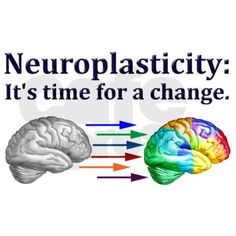 I was born with an average 100 smart score brain. My older brother was born with a 115 smart score brain.
I was born with an average 100 smart score brain. My older brother was born with a 115 smart score brain.His intelligence score was 100 for a long time, then he raised it to 115. I have raised my intelligence to 150, through the things I learned, through the things I did.
 Learning is what makes your brain adaptable. Being adaptable is the number one criteria of self-selection, learning is what makes you perform activities that required from life, to make a living, and what are required by your "spirit" to become all you can be...to live a life worth living in all areas of life, health, wealth, relationships and fulfillment.
Learning is what makes your brain adaptable. Being adaptable is the number one criteria of self-selection, learning is what makes you perform activities that required from life, to make a living, and what are required by your "spirit" to become all you can be...to live a life worth living in all areas of life, health, wealth, relationships and fulfillment.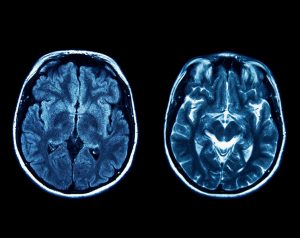 Learning in a civilization that only encourages learning in words... where the level of self-illusion is sky high, in a world like that learning is nearly impossible... Competence is rare in any area of life... and humanity is getting dumber.
Learning in a civilization that only encourages learning in words... where the level of self-illusion is sky high, in a world like that learning is nearly impossible... Competence is rare in any area of life... and humanity is getting dumber.
But how do you teach people who know nothing about learning, who think they learn, but their lives prove it otherwise?
I have been sleeping well. Work through the day, 12-14 hours, by the way. And I have been doing a lot of work in my sleep.
Most of my work of learning how to teach happens while I sleep.
When you sleep with consciousness not turned off, i.e. I sleep consciously, I can actually see through the dreams that the brain is trying to make sense of the material, and goes over it over and over... ten, twenty, and if the material isn"t taking root, maybe more.
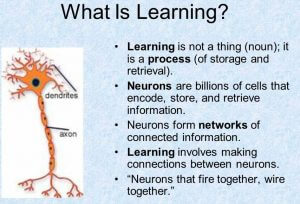 The work the brain is doing is is the work it takes to create those groupings of neurons that will fire at the same time to solve problems. It"s work that cannot be done during the day: the brain needs to be free to put all its attention. ((
The work the brain is doing is is the work it takes to create those groupings of neurons that will fire at the same time to solve problems. It"s work that cannot be done during the day: the brain needs to be free to put all its attention. ((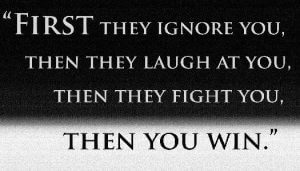 Brain researchers, brain scientists say: neurons that fire together will wire together. This is true with learning through doing... like typing. But in intellectual learning, in my empathic view, the reverse is true: neurons need to be wired together through work, and through association, connecting the dots, before they start to fire together. I am going to get a lot of flak for saying this... just like for saying that smarts are born with... Oh,such is the life of a pioneer. First they will laugh at you...))
Brain researchers, brain scientists say: neurons that fire together will wire together. This is true with learning through doing... like typing. But in intellectual learning, in my empathic view, the reverse is true: neurons need to be wired together through work, and through association, connecting the dots, before they start to fire together. I am going to get a lot of flak for saying this... just like for saying that smarts are born with... Oh,such is the life of a pioneer. First they will laugh at you...))What I see in the way the dreams morph is that the brain tries it this way and that, until it makes sense.
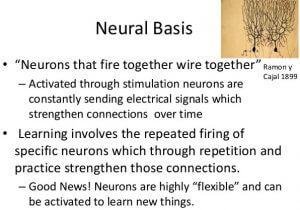 For example, the idea that long term memory chunks combine with each other to form a raft was a big hooha ((hooha: A fuss, uproar, commotion or stir; hype)) for the brain. It wasn"t quite buying it... it was working, visually, with logs, but shaping and tying logs together wasn"t quite expressing what is actually happening in the brain.
For example, the idea that long term memory chunks combine with each other to form a raft was a big hooha ((hooha: A fuss, uproar, commotion or stir; hype)) for the brain. It wasn"t quite buying it... it was working, visually, with logs, but shaping and tying logs together wasn"t quite expressing what is actually happening in the brain.So what is happening in the brain of people who want to learn something?
It is more like electrical switches combine to something bigger, and the switches, the order in which they turn on will be a determinant in the speed and ease of turning it on and using it.
I have visited the brain of some of my students who have a learned profession, and I didn"t find any functional "islands" of switches combined... Their brain never did the optimizing, combining, and thus making it instinctual and fast, the work the brain does at night.
Why? Because their brains were busy processing all the unfulfilled desires they have, all the hurts, all the offenses, all the petty grievances they have with the world, with the people in it. Not being able to perform their learned profession fast and well, automatically.
This is why machines will take over most of the work on earth, because they are faster than the plodding untrained brained people...
People, the teachers of the learning courses, the students, all think that it is enough to acquire good study habits, but I dare to differ.
Until you free up most of your brain from processing the inconsequential, insignificant, and emotionally charged petty stuff of the day, your life, your brain won"t be freed up to process learning.
Whether you"ve known it, or are just learning it now, everything I do when I raise your vibration, is invent or discover new ways to free your brain from having to deal with the minutiae of your day, by lifting you above and teaching you ways that you can see that most of what"s been keeping you busy was either untrue, or unreal... as in not real, not in reality, part of the universal hypnosis all human are trained to fall under...
Every single video, every single webinar, every single article is about that.
Because no matter how good learning habits you learn, if your brain won"t process, organize, and then "fixates" the process in your brain, you are as good as haven"t done any work.
Horrible but true.
The purpose of learning is to get something done. Learning to know is for the 99%, learning to use it is the 1%.
But if you have hundreds of impulses working against using that new knowledge, then the new knowledge cannot be implanted, and cannot be used.
It is easiest for me to see with knowledge and activities in the area of health... Why? Because it is largely the same for everyone. What you do for your work, for your relationships... that is different for every single person.
And I am watching people who take the information, maybe even test it, practice it for a while, but it never became "working knowledge" because it is dropped after a while... the moment conscious attention is drawn somewhere else, the new behavior based on the new knowledge disappears.
Only when you get to unconscious competence, i.e. you don"t have to think about it, that you actually built those neuron islands that are wired together so they can fire together.
There are eight students in the Playground that is halfway through the program.
One has a definite large island of neurons that fire together, and I have seen that new knowledge is able to connect to it. How do I know? There is joy. Excitement. A sense of adventure.
Another has two islands that she could connect new knowledge to, but she hasn"t.
And the six I haven"t mentioned? No islands of neurons that fire together.
When you can think without thinking, meaning your brain is thinking and you are free to do whatever you are doing, that is a sign that you have working "chunks" in your brain.
I remember when I was 16 years old, I had to change schools. In the new school they had a different practical knowledge teaching. In the old school it was, I don"t have a good word for it, but we cut, shaped, bent, rasped steel pieces in a factory. The boys had car repair.
In the new school the girls did shorthand and typing, so that is what I had to learn. But the class was a year and a few months ahead of me, so I had to catch up.
It was intense learning. Both shorthand and typing builds chunks in your brain, or it still has to remain conscious competence, so it will be slow and tiresome.
For months my brain was typing or alternatively shorthanding everything I thought, everything I hears spoken. Nights just weren"t enough time to do that.
I remember at the New Year"s Eve dance I wasn"t good company, because my brain was busy doing the "macarena" and I could not even speak.
But all that activity died down in about three months, and I became a great typist and an ever better shorthand person... my brain can still do it, even though my hands don"t remember the shorthand... especially because it was in Hungarian. Every language invents abbreviations differently, depending on the language.
And for those of you who have to write: if your typing skill is not completely automatic, you either type slowly, or what you write will be like a cart with only four wheels, clunky. Your conscious mind has to process finding the letters, and your brilliance will be decimated.
I play Freecell while I listen to stuff. My conscious brain is listening to the audio, and my autonomous brain is playing Freecell. And occasionally the autonomous brain finds you patterns... then I stop the audio and let the unconscious brain fix the new pattern into the neural structure, making it, unconsciously available for the future. But I do stop the audio... so the brain has freedom to do the work, and doesn"t have to juggle stuff that would prevent it from doing it.
I don"t multitask. Multitasking is using the same part of the brain for two things... I can"t do it, and neither can you. But you can switch back and forth...
In some partner calls I hear one party doing something that they need to pay attention to. Even eating is something you pay attention to... especially if you don"t want to let others in on the fact that you are eating.
So those segments of the partner calls are as good as never happened: you cannot hear when your attention is somewhere else.
Or you are on a call with me, and look up some stuff on google... or check your email... do you think you heard me while you were doing that?
Same is with your unconscious brain activity while you read, or try to listen. Your brain also works on something, most likely totally unrelated to what the reading or listening is about. Most likely about yourself, or about your feelings, about the future, about worrisome things.
Those things occupy two-three maybe even four or five of the seven working memory slots the brain can handle... So if the new thing is anything more complicated than what a kindergartner can process, you won"t get it, it will be noise to you.
I can hear this happening on the course sessions, or even in the one-on-one calls, especially when I listen to them from the recordings.
So you have nothing getting through the inside noise, and even if it did, you have no empty memory slots to process it with.
Catch 22, ((catch 22: a dilemma or difficult circumstance from which there is no escape because of mutually conflicting or dependent conditions.)) if I have ever seen one.
You are disabled every step of the way.
Until you clear your brain of processing memories, emotions, and other unreality... you can"t learn anything...
So this morning I have been pondering if the Kaizen method would be useful. The Kaizen method is the method of the tiny steps.
The size of steps your kindergartner brain can process all the way, from getting it, and from processing it into the permanent memory where the neurons get wired together, so they can fire together. ((“Kaizen is a teaching philosophy that is based on short learning units with many feedback loops and continuous testing of the students’ knowledge,” says a professor who teaches the Kaizen way.
and another quote:
Learn to be thorough before working on speed. The speed will come naturally with competence.))
You can see that the homework attitude: the result is more important than the process, kills learning...
If you cannot do it well slowly, you"ll remain bad at it, and worse at it at high speed...
Learning is a painstaking process...
...approximately learning is not learning, it is rushing through it, and the result: brains without neurons that fire together, entire populations with nothing usable in their brains. Nothing to produce with. Nothing to solve problems with. Nothing to learn new things with.
This is where we are right now. Humanity.
For most people, if you want to learn, you have to start at square one.
It"s both good news an bad news: bad news because you have lost a lot of time. Good news is: you are starting... if you are.
Most people, even if they are in my courses, will feel it is below them to start from nothing... their delusional self, the precious "I" won"t let them.
So what you read, what you listen to, cannot really have permission to connect to anything.
All my courses, all my programs are experiments.
I always include people who are hard to teach, and even people who are impossible to teach. This is why I need to take your starting point measurements before I accept you as a student.
Why don"t I just go for the on percent of the one percent that can be all they can be easily?
It is because of my commitment to all-knowledge, to Source.
All the learning, all the experiments are stored in all-knowledge to become the new starting point for humanity, when humanity will become interested in surviving as a species... if ever.
And the knowledge about my attempts to break through to people, to remove their barriers to learning, are going to become part of the all-knowledge... whether I succeed or not.
In the workshop where I start to formulate my From upset to Communication workshop, another experimental course, I cycle through several people who cannot be taught.
Interestingly, people who cannot be taught, won"t be taught flock to me... while people who want to learn, who are committed to learn, are rarely coming to me.
In that workshop session I spell out what attitude one needs to have to be willing and able to learn.
Not one person has been interested... and that is telling. Very telling.
If you are one of the exceptions, or you haven"t seen this offer before, you can still buy that video... and learn the magic words that can activate your willingness to learn.
Why am I making you pay for it?
Because for you talk is cheap. But if you paid to learn the words, maybe you"ll value them, at least a little bit.
Those words are worth a million bucks, or more for you... Million bucks that you won"t be able to earn without saying those words.
 I want to learn those magic words and USE them!
I want to learn those magic words and USE them!
No comments:
Post a Comment